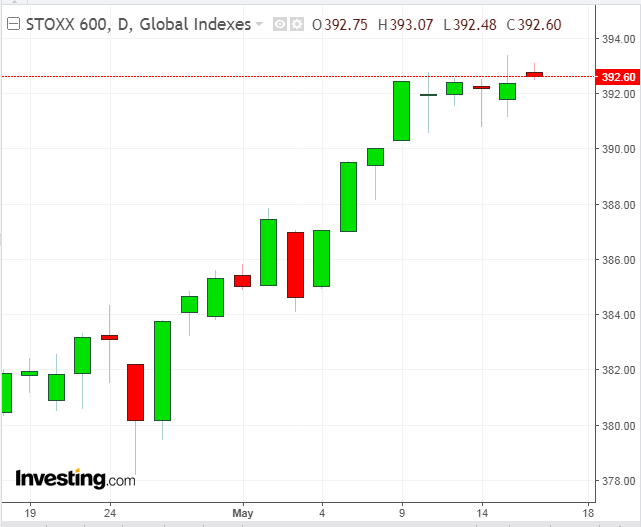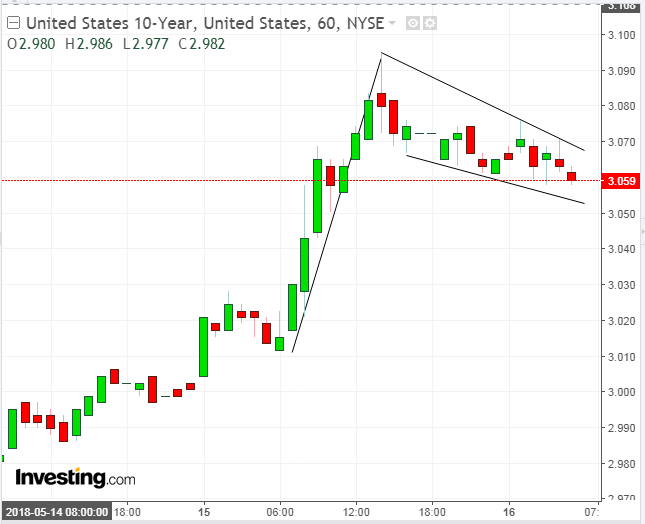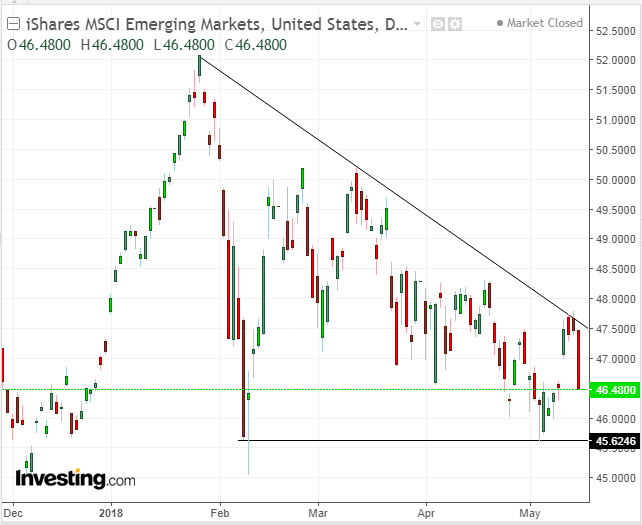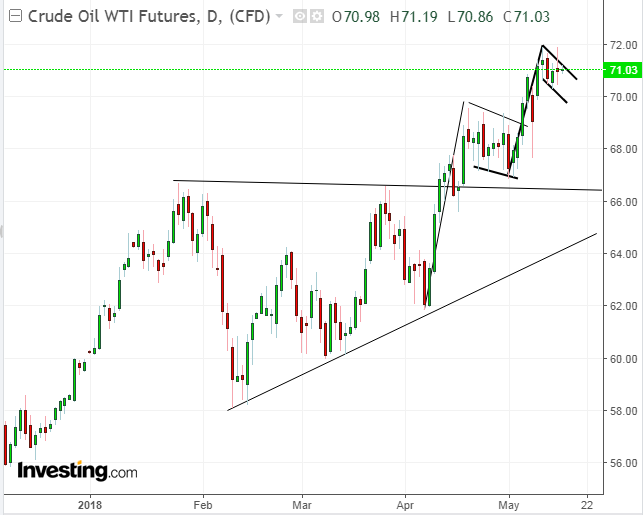-
European stocks, US futures feel the heat after gaining traction in early trade
-
US shares yesterday posted worst performance in 2 weeks
- US Treasury yields ease but remain above 3 percent mark
-
North Korea threatens to end ongoing talks with the US, reigniting investor worries
-
Miners outperform in Europe; oil remains high
Key Events
Equities in Europe eked out a gain in Wednesday's early trade, which was echoed by US futures on the S&P 500, the Dow and the NASDAQ 100, as stock markets attempted a recovery from losses during the volatile Asian session. Yields on the 10-year Treasury are currently retreating from yesterday’s spike, helping the equity market rebound. However, both European indices and US futures are flashing red at the time of writing.
The Stoxx Europe 600 opened this morning at its highest level since February 1—helped by the outperformance of miners—boosting hopes that traders would finally break through the tight 0.1 percent range they've been constrained to over the last four sessions.
The upbeat European open followed a volatile Asian session that saw most gauges slip lower. Japan’s TOPIX began trade this morning in negative territory but managed to bounce back during the fourth hour with a 0.5 advance, settling at a 0.25 percent second day decline, trimming a total of 0.3 percent over the period.
China’s Shanghai Composite opened 0.35 percent lower and extended the slide to 0.6 percent in the first hour of trade. From the second to the fifth hour it pared all intraday losses, but then lost ground again and closed 0.7 percent lower, wiping out most of its two-day gains.
Hong Kong’s Hang Seng opened 0.75 percent lower and was forced even lower, to negative 1.15 percent, during the first hour, after attempts to rebound ultimately failed. In the following three hours it turned losses into a 0.25 percent advance, but only to lose half of those gains in the fifth hour. It closed about 0.1 percent in the red.
South Korea's KOSPI fell half a percentage point during its opening hour, rebounded in the second hour (+ 0.1), then fluctuated within a half percent range in the following five hours. It managed to end 0.05 percent higher to end a two-day decline.
Australia’s S&P/ASX 200 outperformed and had a much simpler trajectory, rising in the first three hours by 0.5 percent, only to shave gains to 0.15 percent in the second half of the session.
While the resilience posted by the KOSPI and Hang Seng is particularly surprising if we consider that the two benchmarks stand to take the hardest hit from diplomatic failures over North Korea's denuclearization, there is a method to this apparent madness: stock prices were boosted by falling FX.
An additional sign of optimistic sentiment: following a bloodbath in the US session yesterday, the small Asian losses earlier today, after which Europe opened higher, accompanied by rising US futures, no less, could signal a global rebound.
Global Financial Affairs
US equities ended a four-day straight advance on Tuesday, with the S&P 500 sliding 0.68 percent and dragging every sector into the red. Real Estate (-1.69 percent) led the plunge, followed by Health Care (-1.29 percent) and Technology) (-0.94 percent).
The NASDAQ Composite was the worst performer, losing 0.8 percent, followed closely by the Dow, which dropped 0.75 percent. Only the Russell 2000 managed to hold steady.
Yesterday's equity plunge, which was the heaviest in nearly two weeks, followed the strong rise of 10-year Treasury yields, once again above the key 3 percent mark. Yields registered an intraday high of 3.095 percent, scratching 3.1 percent for the first time since mid-2011, but ended at 3.07. Understandably, today's retreat from those highs helped the global equity rebound. However, we see a retrenchment of yields as a short term trend: their longer term trajectory points upward.
Moreover, the decline from yesterday's intraday high is also within a pattern of a bullish Falling Flag, on an hourly scale.
Higher yields, which underscore expectations of higher rates, is not the only factor playing on investor sentiment. Risk appetite was also dented by disappointed over a positive resolution of trade tensions between the US and China.
We predicted that US President Donald Trump and his administration would avoid stoking the fire with China in the run-up to the June 12 summit with North Korea, given China's leverage Pyongyang and its nuclear plans. Trump went beyond expectations, publicizing his plans to save Chinese telecom ZTE (HK:0763) from the crippling effects of a recent US ban. Coming from the most prominent advocate of nationalism and detractor of China, this latest move alleviated a cumbersome headwind for traders, who therefore bid stocks up with a vengeance. However, a backlash from US lawmakers from both sides of the aisle reignited investor skepticism over an easy solution to the ongoing trade tussle.
But the story doesn’t end there. Investors were dealt a tough blow last night when North Korea suddenly threatened to abandon the negotiation table if the US persisted with one-sided demands that would set North Korea up for a political fate similar to that of Libya and Iraq.
However, the more positive market narrative, visible earlier today, underpinned investor resilience. Yet again, equity traders tend to disregard geopolitical risk. Perhaps, yields' spike yesterday, and their retreat today, is currently a stronger driver for equity performance.
The outlook for faster interest rate hikes was further boosted by upbeat US retail sales data posted yesterday. Sales rose 0.3 percent in April, matching the median forecast, after a 0.8 percent advance the previous month.
The results fuel expectations that consumer spending, one of the most crucial contributors to the US economy, is poised to rebound from its first-quarter weakness. A strong job market and higher take-home pay in the wake of tax reductions are buoying American purchasing power, compensating for the drag of higher fuel prices.
Bets that the Fed may raise rates three more times this year are on the increase, which in turn pushed the Dollar Index to its highest level since late December on Tuesday.
Elsewhere, Italian government bonds slumped as populist parties struggled to reach an agreement to form a new government, while notes from core European countries followed US yields higher.
In Emerging Markets, equities edged lower after dropping the most since March yesterday; currencies held on to declines after the biggest slide in a year. Emerging markets are on course to provide a downside breakout to a Descending Triangle Top, implying a double-digit correction, akin to the one in late January.
Oil whipsawed wildly yesterday, a result of all the geopolitics currently dominating the commodity market narrative. However, it has been trading within a second consecutive bullish Falling Flag since the beginning of the month, to follow the Ascending Triangle between late January and mid-April. An upside breakout of $72 would imply a $77 target. There are a number of fundamental reasons on the horizon that could boost oil prices as well.
Up Ahead
-
US industrial production is due on Wednesday.
-
Cisco (NASDAQ:CSCO) is due to report earnings on Wednesday after market close, for the fiscal quarter ending April. Consensus EPS is $0.59, after the company reported $0.54 EPS for the same quarter last year.
-
Walmart (NYSE:WMT) is set to release its results on Thursday, before market open, for the quarter ending April The EPS estimate is $1.13, after last year’s $1.00 for the same quarter. Here's the key metric to watch when they report.
-
Campbell Soup (NYSE:CPB) will publish earnings on Friday before market open, for the fiscal quarter ending April, with an EPS forecast of $0.61 after posting 40.59 for the same quarter last year.
Market Moves
Stocks
-
Futures on the S&P 500 rose 0.1 percent
-
The STOXX Europe 600 Index is 0.1 percent higher, the highest tin almost 15 weeks on the largest gain in a week.
-
UK's FTSE 100 advanced 0.1 percent to the highest in almost four months.
-
Germany's DAX jumped 0.1 percent
Currencies
-
The Dollar Index fell 0.15 percent, ending a two way, 0.85 percent advance
-
The euro rose less than 0.05 percent to $1.184
-
The pound remained flat at $1.3500, the strongest in almost 20 weeks.
-
The yen advanced 0.2 percent to 110.16 a dollar.
Bonds
-
US 10-year Treasury yields fell one basis point to 3.06.
-
Germany’s 10-year yield slid by two basis points to 0.62 percent, the biggest fall in almost two weeks
-
Britain’s 10-year yield fell also by two basis points to 1.496.
-
Italy’s 10-year leaped by a whopping four basis points to 1.993 percent, hitting a two-month high.
Commodities




